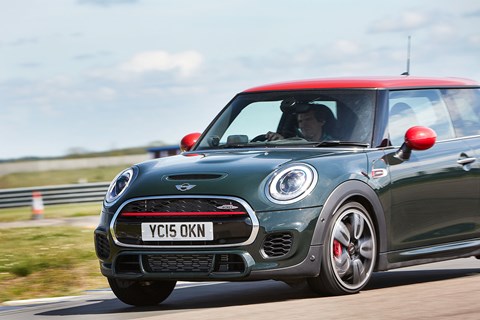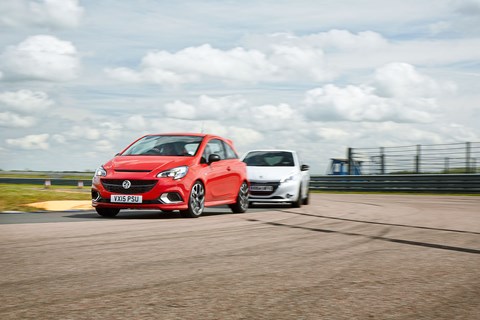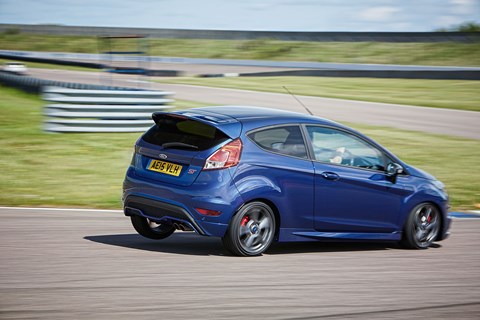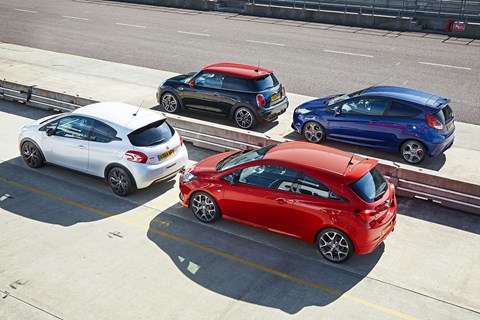► Mini hot-hatch group test
► Ford vs Vauxhall vs Peugeot vs Mini
► Finding the true hot-hatch sweet spot
Forget those new 300bhp+ family-sized monsters, the real hot- hatch sweet spot is now the supermini class, where compact dimensions and circa 200bhp gleefully distort the smiles-per-mile scale with mischievous dexterity, hard-hitting performance and that special ingredient: affordability. In theory.
The cars
Here we have two old-stagers and a double shot of fresh blood, tested on road and track. That’s only ‘old’ in the context of a yoof that changes its phone every five minutes, of course. The Fiesta ST arrived in 2013 and has already entered into fast-Ford lore, while the 208 GTi 30th was initially deployed as a limited edition last year, but has subsequently morphed into a full production model in the recently revised range under the tell-tale title of ‘208 GTi by Peugeot Sport’, and priced at the same £21,995. Hoping to give them both a duffing are the brand spanking Mini John Cooper Works and very latest Vauxhall Corsa VXR, newcomers that couldn’t be more different.
At £17,995, the Corsa is a bargain bruiser, amphed up as tested with the optional £2400 Performance Pack. This adds the urgent Drexler limited-slip diff from the preceding Nürburgring edition, 330mm Brembo front brakes, 18-inch wheels with Michelin Pilot Supersports and stiffer settings for the trick Koni FSD shock absorbers. This aside, updates to the engine include an entirely new induction system, intercooler and turbo-integrated manifold, while completely overhauled suspension promises to close the agility gap on previously more adept rivals. Apparently the ‘Lex Ferrari’ exemption from EU drive-by noise regulations also helps it squeeze an extra decibel past the blokes with clipboards. Can’t help wishing Vauxhall had put this to better use – punchy this 202bhp 1.6 may be, charismatic it is not. But you might have guessed that from the visuals, which trade style for belligerence. Just look at all the vents in the bumper.

John Cooper Works Mini
Sadly, there’s no EU paperwork wrangle for speeding ticket exemption. Which would be handy in all of these cars, but especially the Mini. This third-generation JCW is the marque’s most powerful model ever. Upsizing from a 1.6 turbo to a 2.0 turbo between generations means it now has 228bhp, and 0-62mph takes only 6.1sec thanks to the launch control that comes with the optional automatic gearbox (the entire initial production run was thus equipped, though a six-speed manual remains standard). That’s 0.4sec faster than the Vauxhall and the Peugeot, and a massive 0.8sec faster than the Ford – compounded by 236lb ft at just 1250rpm, making this pocket rocket the Saturn V of this particular grouping. Boy, is it fast.
At £23,050 basic, £24,380 with the auto, the Mini further justifies being most expensive by coming equipped as standard with Brembos, high-strength steel suspension components and torque-steer-resistant split driveshafts. It also makes such amusing noises that you can almost forgive it the lack of steering feel. Shame the range of popping and banging sounds is so consistent you’d swear the on-board brain is selecting special effects from a menu rather than letting the engine breathe to its maximum. Hands up who’s surprised.
In fact, the Mini is a strange blend of maturity and madness all round. It’s the only car here to offer two-stage variable damping – well worth the £240, since you can mix and match the settings with the drivetrain and gearbox; it’s brutal in Sport on the road, but otherwise impressively composed – the interior is by far the best quality, and it’s packed with as much premium tech as your wallet can handle, including a head-up display in this instance. Yet that cabin is such a crazy mix of materials and intricate details that you’ll go dizzy trying to figure out where to look first.
More dizziness from the super-quick steering, which delivers a really darty, dynamic initial impression, augmented by Mini’s multi-level electronic traction control systems. But the response is so slick all the intimacy of feedback slips away in your hands, and with that super pokey engine it starts to feel nervous at higher speeds, despite ultimately not being as pointy as the Peugeot or Ford. The auto ’box probably doesn’t help, but the end result is the hot hatch made synthetic – very smooth, very capable, but lacking in the gritty involvement that makes the best so addictive.

Peugeot 208 GTi 30th
If it’s gritty involvement you want, try the Peugeot 30th. Adding a wider track, stiffer suspension and the Torsen mechanical limited-slip diff from the RCZ R, Peugeot Sport has put beef on the bones of the regular 208 GTi, while an extra 8bhp brings the Pug’s 1.6-litre turbo up to a symbolic 205bhp/208ps, shaving 0.3sec from the 0-62mph time in the process. With shorter gearing and recalibrated steering, this is immediately a much more determined machine. Our car has dodged the dubious Coupe Franche two-tone paint option, but with matte black wheelarch extensions, new 18-inch wheels and 10mm lower stance it looks decidedly purposeful – a chunky pair of Peugeot Sport seats keeping up this impetus inside.
On track, it is awesomely focused. The neat and tidy, fast-lapping experience is dominated by the diff – but rather than being overbearing and unpredictable (cough Corsa cough), this manifests as immense, consistent traction and massive forward momentum, encouraging you to push harder and faster with every rotation. Mega brakes – the third, and best, set of Brembos here – provide further confidence, and if the steering is still a little light, the tiny wheel exacerbates its eagerness to turn in and you’re never left doubting its accuracy. Yet by softening the front anti-roll bar, backing off the traction control and boosting the rear springs by 80%, Peugeot Sport has dialled in a chassis that can and will dance about if you choose to exploit critical moments of weight transfer. It’s never quite as comfortable to tango with as the Fiesta, but if you want wild corner-entry angles they’re available.
Where the 208 is more comfortable is on the road, since the 30th retains much of the standard GTi’s suppleness in spite of the successfully enhanced body control. It’s also got excellent pedal spacing, every joyful heel-and-toe making up for a manual shift action that’s a touch soft and mushy. We’ll take this over the vague notchiness of the Corsa’s gearchange any day, though; Vauxhall says the throw is 13% shorter now, so it’s amazing that it manages to remain so balky and obstinate. Nasty gearknob, too. The stitching feels rough in your palm, and with its awkwardly squared-off shape it’s like a golf club in a gimp mask.

Vauxhall Corsa VXR Performance Pack
And herein lies our difficulty with the Corsa VXR. It is not a bad car in isolation, but brought into this group it’s let down by the details. The interior is so plain that even a nice steering wheel and the fabulous shell-backed Recaros struggle to raise any enthusiasm, and that’s with the Vogon chic of the banded leather finishing. Driving it, you find yourself wanting more of everything – more noise, more revs, more steering feel and, critically, either more compliance or more control. How has Vauxhall made it so stiff yet so woolly feeling? The only exception to this rule is the Drexler diff. We’d have less of that, were it possible, as it comes in with such aggression you have to wait it out before fully committing as you can’t always predict which way the nose is going to jink under power. Then you hit the limiter, the sheer uniformity of the blaring engine note offering no aural warning to upshift at all. It’s kind of fun in a raw, scruff-of- the-neck sort of way, but becomes increasingly frustrating. If you aren’t going on track we’d strongly suggest you avoid the Performance Pack temptation.

Ford Fiesta ST
When it comes to avoiding temptation, the Fiesta ST looks positively angelic in this company. Yes there’s a body kit, but with no garish decals, over-sized air scoops or ginormous brake set-up, it seems almost quaint and certainly dainty. The stated 180bhp power output of this bone stock version reflects this deception, as does that comparatively sluggish 6.9sec 0-62 time. And the interior? Divisively huggy seats aside, it’s the same terrifying phalanx of scattershot buttons as your mum’s regular shopping trolley. Oh, how it plants the seed of lies! If any of these cars is going to get you into hijinks and scrapes, it is most definitely this one.
That 180bhp is an insurance-massaging subterfuge, for a start – in the American market, the Fiesta ST is ratified at 197bhp, which is what the turbo 1.6 actually peaks at on overboost. It is also decidedly the most naturally aspirated feeling of any of these units, not entirely lag-free but revvy and willing, and ballistic towards the top. The gearshift is the most positive, too, while the steering layers on detail in such a manner that you can’t help but dive in and indulge. It’s not as if the chassis is going to turn down your advances – the torque-vectoring electronics that substitute for a mechanical diff in the front of the Ford are capable of gymnastic feats no other car in this test can match, and for an artificial aid it is incredibly transparent in its intentions. It will make you feel like a god. Albeit a god with a bit of a sore back, given the pogoing, hyperactive firmness to the accompanying suspension. Honestly, you tend not to mind.
Verdict
Is the ST the supermini king? Well, it is both the cheapest and the biggest bundle of fun – and that’s without the officially approved Mountune kit, which takes the engine up to 212bhp for £599 without decimating the warranty. Expect to eat brake discs. In fact, you might as well get them on subscription, not just because you’ll be going so fast but also because the torque vectoring relies on them, slowing the inside front wheel to enable those amazing direction changes. And this is where, for some, the Peugeot disputes the hegemony – with its diff always driving it onwards, you’re never held back, never slowed down, something that will surely appeal to those who value outright progress over intimate immersion and flexible control. Either way, the old-stagers shade the upstarts, as the pricey Mini proves too cool to rule, and the Corsa still hasn’t the mastered the necessary table manners.

The specs
Vauxhall Corsa VXR Performance Pack
Price: £20,395
As tested: £21,590
Engine: 1598cc 16v turbocharged 4-cyl, 202bhp @ 5800rpm, 206lb ft @ 1900-5800rpm
Transmission: Six-speed manual, front-wheel drive with Drexler limited slip differential
Suspension: MacPherson struts front, torsion beam rear, Koni FSD dampers
Performance: 6.5sec 0-62mph, 143mph, 37.7mpg, 174g/km CO2
Weight: 1293kg
Rating: ***
Ford Fiesta ST
Price: £17,545
As tested: £20,515
Engine: 1596cc 16v turbocharged 4-cyl, 180bhp @ 5700rpm, 214lb ft @ 3500rpm
Transmission: Six-speed manual, front-wheel drive with torque vectoring
Suspension: MacPherson struts front, torsion beam rear
Performance: 6.9sec 0-62mph, 139mph, 47.9mpg, 138g/km CO2
Weight: 1163kg
Rating: *****
Mini John Cooper Works automatic
Price: £24,380
As tested: £31,945
Engine: 1998cc 16v turbocharged 4-cyl, 228bhp @ 5200rpm, 236lb ft @ 1250rpm
Transmission: Six-speed steptronic automatic, front-wheel drive with electronic differential lock control
Suspension: MacPherson struts front, multi-link rear
Performance: 6.1sec 0-62mph, 153mph, 49.6mpg, 133g/km CO2
Weight: 1295kg
Rating: ****
Peugeot 208 GTi 30th
Price: £21,995
As tested: £22,145
Engine: 1598cc 16v turbocharged 4-cyl, 205bhp @ 5800rpm, 221lb ft @ 1750rpm
Transmission: Six-speed manual, front-wheel drive with Torsen limited slip differential
Suspension: MacPherson struts front, torsion beam rear
Performance: 6.5sec 0-62mph, 143mph, 52.3mpg, 125g/km CO2
Weight: 1160kg
Rating: ****